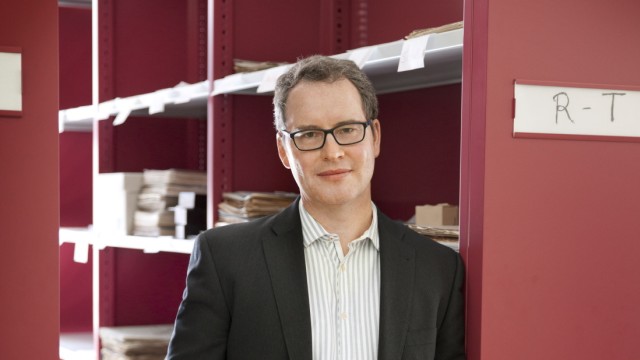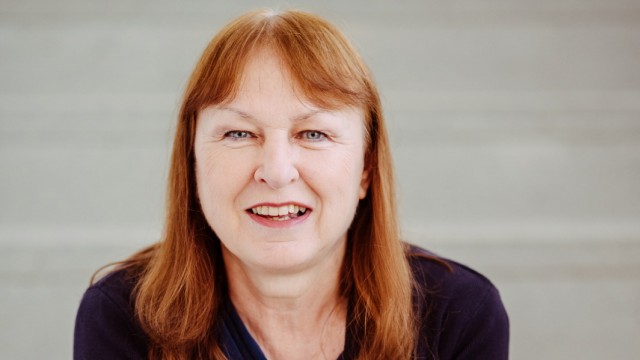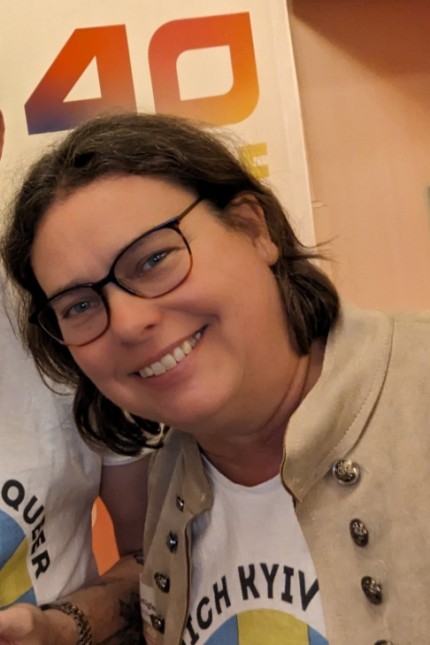Give up
It doesn’t sound confident at all, and that’s true Hugo Bachmaier, 65, something called. The eternally cheerful owner of the “Zum Bachmaier” on Leopoldstrasse, who is also referred to as a celebrity host in the tabloid media, will probably have to quit at the end of the year. “Yes,” he said last weekend, “I probably have to go out.” The Hofbräu brewery did not extend his contract. Bachmaier has been hosting all kinds of trash events in his restaurant for 18 years and was happy to be photographed in macho poses with barely clothed women. Maybe it was because of the external image and not, as Bachmaier believes, because of his age.
Guide
Katja Bonnländer, artist and art therapist.
(Photo: private)
The Mohr Villa has been offering art therapy for people with cancer for 20 years now. This anniversary is now the occasion for an exhibition that will show how work is done in the open studio and what moves the participants. The title of the exhibition shows the direction of the works presented: “Flowerpower – the Moment of Beauty”. A deliberately chosen, optimistic title. Because the moment of beauty also plays a crucial role in art therapy research, we know Katja Bonnländerwho has been running the studio in Freimann (Situlistraße 73-75) since November 2018.
A recent study has just defined the experience of beauty as a counterpoint to fears, depression and pain associated with cancer, says Bonnländer. She sees the open studio as a “protected, creative space” in which there is space for emotions and thoughts that are often incapable of being expressed in words. The participants “open themselves up to inner impulses and colors.” The visual artist studied free painting with Diet Sayler at the Nuremberg Art Academy and then studied art therapy with Gertraud Schottenloher at the Munich Academy. She now teaches there as a freelance lecturer. Bonnländer has been working in clinical and non-clinical areas for more than 20 years. She accompanies people with serious life-limiting illnesses, offers art therapy for children and adolescents and often works transculturally.
The exhibition can be seen until September 2024 in the rooms of the Bavarian Cancer Society, Nymphenburgerstrasse 21a, Monday to Friday, 10 a.m. to 4 p.m.
Store

Master of the files: Julian Holzapfl.
(Photo: Bavarian State Archives)
The Munich State Archives, which is also the central contact point for local history and family research in Upper Bavaria, stores a good 15.1 million archive items – lined up end-to-end that would be almost 49 kilometers, from Munich’s Marienplatz to Lake Tegernsee. Its new leader is Julian Holzapfl, he succeeds Christoph Bachmann, who has been appointed director of the Main State Archives. Holzapfl studied historical auxiliary sciences, modern history and English in Konstanz, Galway (Ireland) and at the Ludwig Maximilians University in Munich. In 2006 he received his doctorate with a thesis on “Corporate correspondence in the late Middle Ages in Bavaria: writing, language and political rhetoric”. His fascination with historical written sources led the historian to become an archivist. Holzapfl is well known in many district offices and authorities in Upper Bavaria, as he is responsible, among other things, for sorting out and accepting official documents for the archive. As a lecturer at the LMU, he regularly offers reading exercises on archival sources.
Cheer up

Elisabeth Makepeace, managing director and chairwoman of the KlinikClowns Bayern.
(Photo: KlinikClowns Bayern eV)
The clinic clowns have been working across Bavaria for a quarter of a century and their regular visits to hospitals, care facilities, facilities for people with disabilities and hospices are indispensable. 25 years ago, “Dr. Schnipsel” and “Dr. Tapsel” brought laughter to the faces of little patients for the first time in the Haunersche Children’s Hospital in Munich. And not just there. People in the nursing home experienced joy and personal attention from the first Clinic Clowns in Bavaria. Today, the KlinikClowns Bayern association regularly sends 70 professional clowns “on visits” to 115 facilities from Aschaffenburg to Garmisch-Partenkirchen. Over the past 25 years, the clinic clowns have been able to reach more than 1.4 million people during 40,466 visits and bring them joy and relief in their situation.
Elizabeth Makepeace, founder, managing director and chairwoman of the board, wanted to combine artistic and social commitment in a special way 25 years ago, founded the non-profit association in 1998 and still runs it today. Makepeace says: “More and more establishments have been approaching us where our clown visits are now firmly established, and we are constantly receiving new inquiries.” For the future, she hopes that what hospital clowns achieve will be understood and appreciated more and more, “and that the spirit of humor, the power of laughter, the lightness, the craziness will live on for a long time.”
Next Thursday, October 26th, the anniversary will be celebrated with a big gala in the Munich Künstlerhaus; the evening is already sold out.
Award

Stephanie Hügler, committed member of Munich Kyiv Queer.
(Photo: MKQ)
Munich Kyiv Queer (MKQ) was awarded the Hans Peter Hauschild Prize 2023. The award ceremony took place last Thursday at the 40th anniversary celebration of the Deutsche Aidshilfe in Berlin. Munich Kyiv Queer has been supporting queer people in Ukraine for more than ten years. The contact group and aid organization sees itself as an interface between the Munich scene and the community in Munich’s twin city of Kiev. “We are very pleased about this honor,” says Stephanie Hügler from MKQ. “It shows that our work, which is purely voluntary, is seen and valued.”

